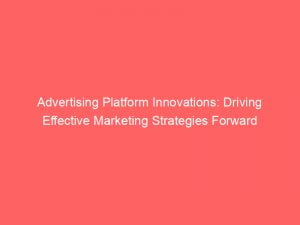In today’s hyper-connected world, the power of digital advertising cannot be underestimated. With the advent of the internet and social media platforms, businesses now have the ability to reach a vast audience like never before. However, with so many advertising platforms to choose from, it can be daunting to find the perfect one that will connect with your target audience and achieve your business goals. In this fast-paced and ever-changing landscape, careful research and analysis are paramount to success. Join us on a journey as we explore the dynamic world of digital advertising platforms and discover the secrets to reaching your audience effectively.
| Item | Details |
|---|---|
| Topic | Advertising Platform Innovations: Driving Effective Marketing Strategies Forward |
| Category | Ads |
| Key takeaway | In today's hyper-connected world, the power of digital advertising cannot be underestimated. |
| Last updated | December 27, 2025 |
advertising-platform">advertisingplatform
An advertising platform is a tool or service that allows businesses to promote and display their ads to a specific target audience. These platforms allow for targeted advertising, creativity, and measurable results. Using multiple ad platforms can help reach a wider audience and increase the chances of users making a purchase through these ads. Some popular ad platforms include Google Ads, Bing Ads, Facebook Ads, Instagram Ads, Twitter Ads, and LinkedIn Ads. Amazon Ads is essential for promoting an Amazon store, while Bidvertiser is recommended for creating low-cost banner ads. AdRoll is a top ad network for retargeting visitors, and Yahoo Gemini provides access to properties like HuffPost, AOL, and Tumblr. Analyzing and choosing the right digital advertising platform requires careful research and analysis. Having a website that can handle traffic from online advertising is also crucial.
This post updated with new ad network performance data.
Key Points:
- Advertising platforms allow businesses to promote and display ads to a specific target audience.
- Using multiple ad platforms can help reach a wider audience and increase the chances of user purchases.
- Some popular ad platforms include Google Ads, Bing Ads, Facebook Ads, Instagram Ads, Twitter Ads, and LinkedIn Ads.
- Amazon Ads is essential for promoting an Amazon store, while Bidvertiser is recommended for low-cost banner ads.
- AdRoll is a top ad network for retargeting visitors, and Yahoo Gemini provides access to properties like HuffPost, AOL, and Tumblr.
- Careful research and analysis should be done to choose the right digital advertising platform, and having a website that can handle traffic from online advertising is important.
Sources
https://www.webfx.com/blog/marketing/paid-advertising-platforms/
https://www.adamenfroy.com/advertising-platforms
https://www.g2.com/categories/digital-advertising
https://aws.amazon.com/advertising-marketing/advertising-platforms/
Check this out:
💡 Pro Tips:
1. Consider using programmatic advertising platforms, such as The Trade Desk, to automate and optimize your ad campaigns across multiple channels.
2. Utilize ad extensions, such as call extensions and location extensions, to enhance the visibility and effectiveness of your PPC ads.
3. Experiment with different ad formats, such as native ads or interactive ads, to stand out from the competition and capture user attention.
4. Implement A/B testing to continuously improve the performance of your ads. Test different ad copy, imagery, and targeting strategies to find what resonates best with your audience.
5. Don’t overlook mobile advertising. With the growing number of mobile users, it’s crucial to optimize your ads for mobile devices and consider using mobile-specific ad platforms like AdMob.
The Evolution Of Advertising Platforms
Advertising platforms have come a long way in recent years, evolving to meet the demands of the ever-changing digital landscape. One of the most popular and effective advertising models is Pay-per-click (PPC) advertising, where advertisers only pay when a user clicks on their ad. This model allows businesses to reach their target audience more effectively and increase the likelihood of conversion.
In addition to PPC advertising, using multiple ad platforms has become increasingly important to reach a wider audience. Each platform offers unique features and benefits that can help businesses connect with their target market. Two of the most effective search engine platforms are Google Ads and Bing Ads. These platforms allow businesses to display ads on search engine results pages, reaching users who are actively seeking products or services.
Social media platforms have also become a significant player in the advertising field. Facebook Ads, Instagram Ads, Twitter Ads, and LinkedIn Ads offer businesses an opportunity to engage with their target audience on a personal level. These platforms allow for precise targeting based on demographics, interests, and behavior, resulting in more effective advertising campaigns.
For businesses looking to reach middle-to-upper-class women, Pinterest Ads can be highly effective. With a predominantly female user base, Pinterest allows businesses to showcase their products or services in a visually appealing way, making it ideal for businesses in fashion, home decor, and beauty industries.
Amazon Ads is an essential platform for businesses promoting an Amazon store. With a vast user base and a high intent to purchase, advertising on Amazon can significantly increase visibility and sales. Additionally, Bidvertiser is a recommended platform for creating banner ads with a low cost-per-click, making it a cost-effective choice for businesses on a budget.
AdRoll is a top ad network that specializes in retargeting. This platform allows businesses to re-engage with visitors who have already shown interest in their products or services, increasing the chances of conversion. Yahoo Gemini is another notable platform that provides access to properties like HuffPost, AOL, and Tumblr, expanding the reach of businesses’ ads.
Other ad platforms worth mentioning include BuySellAds, RevContent, Airnow, AdMob, AdColony, AdRecover, and AdBlade. Each platform offers unique features and targeting capabilities, allowing businesses to tailor their advertising efforts to specific audiences.
Choosing The Right Advertising Platform For Your Business
With the plethora of advertising platforms available, it can be overwhelming for businesses to choose the right one for their needs. However, careful research and analysis can help businesses make an informed decision.
When selecting an advertising platform, it’s essential to consider the target audience and the goals of the advertising campaign. Facebook Ads and Google Ads are often considered the gold standards for online advertising, as they offer extensive targeting options and reach a massive audience. These platforms can be effective for businesses of all sizes and industries.
Geotargeting and remarketing are two useful features to consider when choosing an advertising platform. Geotargeting allows businesses to show their ads only to users in specific locations, ensuring that their ads are seen by the right audience. Remarketing, on the other hand, enables businesses to re-engage with users who have previously interacted with their website or app, increasing the chances of conversion.
Another factor to consider is the type of campaign businesses intend to run. YouTube ads, for example, are highly effective for brand awareness and lead generation. The platform’s vast user base and engaging video format make it an ideal choice for businesses looking to reach a wide audience and generate interest in their products or services.
In addition to Google Ads, Bing Ads is another effective search engine platform that should not be overlooked. Bing attracts a significant portion of search engine users, particularly those who prefer its unique features or are concerned about privacy. Advertising on Bing can help businesses reach an audience that may be untapped by competitors solely relying on Google Ads.
Other platforms that deserve consideration include Amazon Ads, Instagram Ads, and TikTok Ads. Amazon Ads allows businesses to leverage Amazon’s massive user base and high intent to purchase. Instagram Ads, with its visually appealing format, can help businesses engage with a younger audience. TikTok Ads offer a unique opportunity for businesses to connect with Gen Z users, who are highly active on the platform.
For businesses looking to target specific audiences, LinkedIn Ads, Taboola, and Bidvertiser are worth exploring. LinkedIn is a professional networking platform that allows businesses to target individuals based on their job titles, companies, or industries. Taboola is a content recommendation platform that can help businesses reach users based on their browsing habits and interests. Bidvertiser, as mentioned earlier, is recommended for businesses on a budget, as it offers low-cost banner ads.
The Benefits Of Using An Advertising Platform
Advertising platforms offer several benefits that can greatly enhance businesses’ marketing strategies. First and foremost, these platforms allow for precise targeting, ensuring that businesses’ ads are seen by the right audience. By defining specific demographics, interests, and behaviors, businesses can optimize their advertising efforts and increase the likelihood of conversion.
Moreover, advertising platforms provide businesses with an opportunity to unleash their creativity. The platforms offer a variety of ad formats, including display ads, video ads, and social media ads, allowing businesses to choose the format that aligns best with their brand and target audience. Using visually appealing and engaging ads can capture users’ attention and drive them to take action.
Another significant advantage of using advertising platforms is the ability to measure results. These platforms provide detailed analytics and reporting, allowing businesses to track the performance of their ads in real-time. By analyzing this data, businesses can gain insights into user behavior, optimize their campaigns, and maximize their return on investment (ROI).
Maximizing Roi With An Effective Advertising Platform
Maximizing ROI is a crucial objective for businesses when utilizing an advertising platform. To achieve this, careful planning and strategic execution are necessary.
One effective strategy is to leverage the power of programmatic advertising platforms. Programmatic advertising uses automated technology to buy and optimize ad inventory, improving efficiency and targeting capabilities. By utilizing programmatic platforms, businesses can reach their target audience more accurately and reduce waste in ad spend.
Staying up-to-date with new trends in advertising platforms is also essential for maximizing ROI. Innovations such as artificial intelligence (AI), machine learning, and dynamic ad personalization can greatly enhance the effectiveness of advertising campaigns. These technologies enable businesses to deliver personalized and relevant ads to users, increasing the chances of conversion.
Building a successful advertising platform strategy involves setting clear goals and objectives. Whether it’s generating leads, driving website traffic, or increasing brand awareness, businesses must define their desired outcomes and align their advertising efforts accordingly. By setting measurable goals, businesses can track their progress and make necessary adjustments to optimize their campaigns.
Additionally, leveraging data-driven advertising platforms is crucial for targeted campaigns. These platforms utilize user data to segment audiences and deliver customized ads based on their preferences and behaviors. By tapping into this wealth of information, businesses can create highly targeted campaigns that resonate with their audience, resulting in higher conversion rates.
Understanding The Power Of Programmatic Advertising Platforms
Performance Marketing Tips • Programmatic Advertising • Native Ad Network • Buy Traffic











